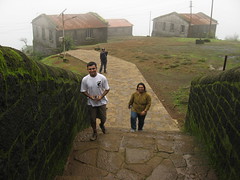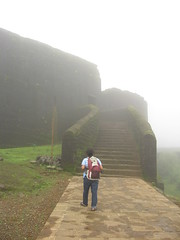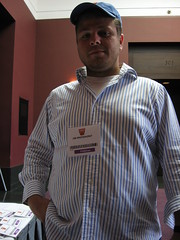On Saturday a few of us hired a car to visit Raigad Fort. On the way, we stopped for a bit at Mulshi Dam. We wouldn’t be meeting Aanjhan and Barkha for a while now and so, even though the day wasn’t perfect for photography, it was the day for fun. More pictures are here.
Monthly Archives: June 2008
Mozilla L10n, perfection and different results …
Seth Bindernagel points to the list thread which asks about “how Mozilla chooses languages to ship”. He goes on to write “The Mozilla process is not perfect, but we hold high standards of perfection. We choose to ship our official, non language-pack locales only when they are ready as a bug-free experience for the end-user.”
The Bengali (India) or bn_IN locale has seen some aspects of the drive for perfection. These are amply documented at bug 398992. If one trawls through the length of that particular bug the aspect that would stand out is the particular attention has gone towards ensuring that as much as possible local language / culture references are taken care of. In some aspects, sites were painstakingly asked about whether they would like to be listed, contacts from the Indian versions of the sites repeatedly poked to ACK their presence. Needless to say, bn_IN isn’t part of the shipped set of languages for Firefox 3. It is partly due to the process phase where one has to productize it for FF2 and then only move on to FF3. And we have been stuck at FF2 for ages now.
In fact, this blog shows that the FF3 downloads of international locales doesn’t have any significant amount of Indic locale downloads. Would this piece of statistic have an impact on Mozilla’s focus and attention to detail when it comes to Indic locales ? I really don’t know. And, would appreciate a straight answer.
However, I see this comment and without a response from Mozilla I am inclined to infer that the drive for perfection is not universal across locales. For bn_IN I am sure that both Runa and me would have liked to have this choice. And it was the team at Mozilla who should have informed of this choice being available.
Is it really about motivation ?
A recent article in a newspaper has Chris Hofmann stating something along the lines of that the absence of any Indic language other than Gujarati and Punjabi from Firefox3 was due to the lack of “motivated” volunteers. Runa has a blog entry responding (in part) to that.
I met Chris during foss.in last year and have been interacting sporadically on mail since then on. He comes across as a person who “gets it” where “it” being the notion of collaborating within a process towards producing open source software. However, this time he did make a broad sweep at existing Indic communities and comes across as extremely rude.
The first point that would be important to note is that across various Free and Open Source Software Projects, the Indic language communities are fairly robust. So, when it comes to Firefox, the stats provided by Gervase are slightly odd. Attempting to reach out to the largest segment of language consumption communities makes sense for a web browser project since it is an artifact of immediate and visible consumption. The discussion around the stats can be found here, here and here. There is a side note from Axel who states that [he is] “generally skeptical on recruiting localization teams. To me, users benefit from a growing community, and they get hardly anything from a one-time effort”
The second point is that a large number of projects tend to fall into the box of being too much interested in localisation and not much in anything else. With the number of constitutionally accepted languages in India, it does make for a great case for herding a diverse set of cats and getting UI bits in the local language. The paradox here is that L10n is just not string crunching. A large segment of the languages have no existing equivalent terms for the technical jargon. Thus, the volunteers-translators-language_maintainers have to be careful in choosing words that convey the essence or, in some cases coming up with words that make sense. This work also includes paying close attention to branding and trademark issues (most of the FOSS trademarks are non existent in the local language) as well as ensuring a consistency of translations across teams working on various modules. If it were mere crunching of strings, theoretically it could be done by machine translations or a translation memory system too.
L10n is thus not merely translation but generation of content. And it is this content that determines how successful a FOSS project / product would be for the language communities. However, L10n is a finite state of affairs. Teams can work with focus and incrementally attain 100% localization after which it turns into a sustenance phase of translation. The projects have to figure out a way of “what next” and start putting stakes in the ground towards doing that. This is the exact place where I don’t see Mozilla or OpenOffice.org put in much work in India. Translation is a beginning towards getting (what_is_called) traction and then one has to build onto that into bigger things. A common thread of complaint that was around from foss.in last year was that the Project Days had a “condescending” approach during the presentations. A part of this can be traced to the lack of will and / or enthusiasm in getting beyond L10n into larger areas of contribution into the core of the projects.
It isn’t always the motiviation of the volunteers that cause languages to slip. Most of the time it is how the project treats its contributors. There’s a lesson in there somewhere.
BOS -> LHR -> BOM -> PNQ
Back $HOME.
FUDCon was a nice experience. Especially meeting up with a few nicks from IRC and the names in “From:”. More to come later. For now, here’s a picture
more to be found at this place.
The elections have begun
On what seems to be turning into a nice day at BOS, I had stuffed myself with a nice breakfast, brewed a cup of awesomely robust coffee and voted. There are a lot of fine folks from Fedora land who are in the fray and if you have a FAS account – you should vote.
Another song, another co-incidence
মনোহরণ চপলচরণ সোনার হরিণ চাই ।।
সে-যে চমকে বেড়ায়, দৃষà§à¦Ÿà¦¿ à¦à§œà¦¾à§Ÿ, যায় না তারে বাà¦à¦§à¦¾ ।
সে-যে নাগাল পেলে পালায় ঠেলে, লাগায় চোখে ধাà¦à¦¦à¦¾ ।
আমি ছà§à¦Ÿà¦¬ পিছে মিছে মিছে পাই বা নাহি পাই —
আমি আপন মনে মাঠে বনে উধাও হয়ে ধাই ।।
তোরা পাবার জিনিস হাটে কিনিস, রাখিস ঘরে à¦à¦°à§‡ —
যারে যায় না পাওয়া তারি হাওয়া লাগল কেন মোরে ।
আমার যা ছিল তা গেল ঘà§à¦šà§‡ যা নেই তার à¦à§‹à¦à¦•à§‡ —
আমার ফà§à¦°à§‹à§Ÿ পà§à¦à¦œà¦¿, à¦à¦¾à¦¬à¦¿à¦¸ বà§à¦à¦¿ মরি তারি শোকে ?
আমি আছি সà§à¦–ে হাসà§à¦¯à¦®à§à¦–ে, দà§à¦ƒà¦– আমার নাই ।
আমি আপন-মনে মাঠে বনে উধাও হয়ে ধাই ।।
Mumbai -> Heathrow -> Westford
I left the monsoons back at Pune to land up into what is being called across news channels as the “4 days of unusual high heat” in Boston. And, to add to it, the locals say that this isn’t summer yet (officially that is) although the temperatures are across high 90s (in degree F) at Westford. 🙁 It wasn’t a completely nice experience flying to Boston via Heathrow with the terminal at Mumbai not having air conditioning, the plane being late at the gate and other associated issues.
Shall put up photos later. The visually striking thing here is the abundance of the “red-brick” buildings. Being used to be looked down upon by steel-glass-concrete highrises in the Indian cities, the uninterrupted line of sight did take time to get used to 🙂
Next move, Westford -> Boston for FUDCon among other things. Now back to reading up stuff.
RadioVeRVe’s got the groove
This (a highlight by Kurt Hanson) is a small bit of good news that was waiting to be shared. The RadioVeRVe folks have been doing amazing work in taking independent music from India to the rest of the world.
If you know of an independent musician or group, you should get in touch with RadioVeRVe.
That little thing about “skill set days”
Since he has decided that he will not blog about this particular topic, the optimal way to take this forward would be to link to the initial mail about “Skillset Days” and from there put a few things into perspective. On a side note, I’d have fancied a blog post. It makes for easier cross linking of ideas and deriving of comments than reading things off a mailing list archive. To each his own I guess.
The central theme of the idea isn’t new. What is a bit new in this proposal is the way it may or may not fit into the fabric of foss.in (and foss.in / 2008). The bedrock for the event is to incubate, develop, foster and mentor contributions and contributors to various Free and Open Source Software Projects. In the background of such sharply defined objectives, an initiative like the Skillset Day tends to look more suited to a Barcamp or a Bootcamp kind of atmosphere. And there are mails on the thread that touch the fringes of that particular notion.
I’d agree and disagree at the same time. And, I think that the initial proposal does require a bit of revisions in terms of what it wants to achieve and for whom. In the current form, it is an idea mashup than a concrete proposal.
The presence of the Project Days at the last event provided an insight into one particular aspect. Having a well defined agenda for a very specific target audience, it is possible to make a change. And this is what I like in the current proposal. It has the seeds to initiate a change and be a force multiplier. At a very high level the proposal seems to be making a compromise set of sessions for the “user” community as opposed to the focus on the “developer” at the Project Day. It would provide a chance to a subset of the event attendees to learn skills that they can go back and attempt to implement in their operational environment.
An aspect to FOSS in India is the fact that a large subset of software development operations choose not to use FOSS tools for software production. The proposal has the beginning of the idea to make that change happen. However, the immediate question would be to figure out “what is an appropriate talk / topic for these days”. There is a greater chance of creating a Barcamp if talks are not selected with proper care and an appreciation of what it is going to achieve. The good thing is that we might end up coaching a large subset of folks about how to produce (free and) open source software.
That is always worth a shot. Always.







